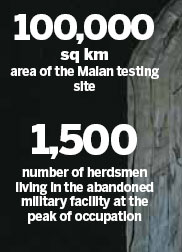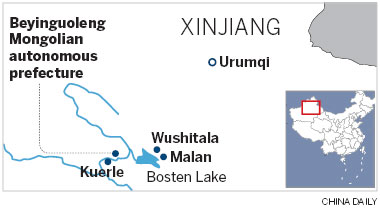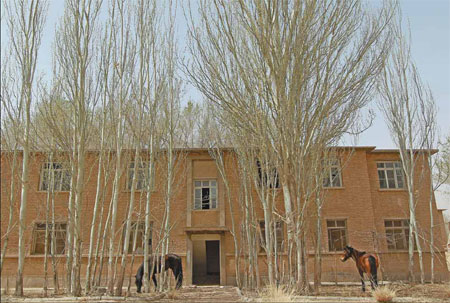Former military base opens doors
Updated: 2013-06-03 08:16
By Cui Jia and Mao Weihua (China Daily)
|
|||||||||||

|
Above: The remains of Malan military base in the Xinjiang Uygur autonomous region have become a home for herdsmen. Below: Local resident Aoriliman, 29, enters the former command office at the base. Photos by Cui Meng / China Daily |


One-time nuclear testing ground is still little known, report Cui Jia and Mao Weihua in Bayingolin Mongol autonomous prefecture.
Editor's note: This is the eighth in a regular series of reports brought together under the banner "Lost Horizons", which aim to show life in the less-reported areas of the country and to give a voice to those whose words often go unheard. Slideshows and video footage are also available at www.chinadaily.com.cn/video
Wushitala township in the Xinjiang Uygur autonomous region is only able to thrive because it is next to the Malan military base.
The township's businesses, such as grocery stores, as well as fruit and vegetable markets, are hives of activity. They buzz with military personnel and curious tourists excited to be near the mysterious and legendary military base - which goes unmarked on maps - where China's first nuclear and hydrogen bombs were tested.
The base remains, but the testing center closed many years ago.
The soldiers and their relatives visit the small restaurants that specialize in cuisine from provinces such as Shaanxi, Sichuan, Shandong and Henan to enjoy a taste of hometown cooking.
A local legend in Wushitala, which means "horse orchid" in the Uygur language, says the center's first commanding officer named the base after the profusion of flowers he saw growing across the moonlike sands of the Gobi desert.
"Horse orchid" is malan in Mandarin Chinese.
At a T-junction in the town, soldiers were planting poplar trees along the only main road in and out of the heavily fenced complex. The closer one got to the entrance, the higher the trees grew.

Malan was built in the 1950s in the Bayinguoleng Mongol autonomous prefecture of the Gobi desert. At 472,472 square kilometers, the prefecture is bigger than the United Kingdom, and the testing site, about 200 km from the base, covers an area of 100,000 sq km, almost equal in size to Jiangsu province.
Its remote location meant Malan was one of the world's best sites for nuclear tests. An added advantage was that much of the radioactive material released by the bombs, which were detonated in mid-air, was captured in the soil of a dried out, funnel-shaped lake called Lop Nur, where it could later be easily collected for examination.
On July 29, 1996, China conducted its last nuclear test. On the same day, the government announced that all nuclear tests would cease as of July 30. After that, Malan's role began to change, but the base was still a highly classified secret.
About 35 km from the base next to Wushitala, Malan's nuclear research center is hidden deep in the Tianshan mountains. Locals say that during the summer horse orchids cover the mountains in a blaze of color.
In 1986, China announced that it would not carry out tests in the atmosphere because of the dangers of radioactive pollution. The Malan center was then abandoned and the members of the research team moved to Xi'an, capital of Shaanxi province.
Flash floods have destroyed many sections of the narrow rugged road to the former research center, although many old military checkpoints still remain as a reminder of the days when the area was a highly restricted military zone.
A home for herders
Now, what was once China's main top-secret facility has become a home for herdsmen.
Aoriliman's family moved to the base when the researchers began to withdraw. Her family lives in the researchers' old accommodation blocks, along with many herdsmen from the Mongolian ethnic group in Nayinke village. Each of the 30 or so households owns at least seven rooms in the identical two- and three-story buildings constructed on both sides of an old cinema. Sheep are kept in pens set up on the land between the buildings.
"My mother, who lived in the mountains nearby, used to sneak into the cinema to watch movies when the soldiers were here," said the 29-year-old. Aoriliman's mother, who passed away in 2005, often told her stories about the base. "She said the soldiers were very kind to the herdsmen and allowed the villagers to buy goods from their grocery store."
At the peak, more than 1,500 herdsmen lived in the former military facility. However, in 2012, the local government decided to turn the area into a tourist park to help visitors connect with history, and most of the residents moved away.
"Many generations of my family have herded in this area. We had to make room for the military base and now for a park. In the old days, their faith in the nuclear program made people work hard, but now they only work for money," said Bayingele, pulling his grandson out of a sheep pen. The 3-year-old had been shooting at the animals with his toy guns - the only firearms seen on the base nowadays.
In days gone by, the base was patrolled by scores of armed guards. "They never said a word about their work," Bayingele recalled. The herdsmen moved in once the center had been abandoned, and gradually learned about the facility's original purpose. "I used to worry that there might still be radioactivity in the buildings, but everyone seems to be healthy," said the 50-year-old.
Bayingele's family will move to another village soon and he said he will miss the base: "I feel like a guardian here. I hope everything will be kept as it is."
"The generals' building" is the name the herdsmen bestowed on the tallest building on the base, opposite the cinema. The building was the brain center of the research center, because 29 generals from the People's Liberation Army successively led research teams there. Deng Jiaxian, a nuclear physicist revered as the "father of the Chinese nuclear bomb", also carried out tests at Malan.
The walls of the buildings bear cracks caused by an earthquake in 2010 and many of the windows are broken. At ground level, the floors are covered with a thick layer of dust and sheep droppings. A slogan painted on the wall reads: "Firmly safeguard the commanding officer led by Chairman Mao".
A glimpse of history
All the local herdsmen are familiar with the manmade tunnel in the mountain behind the generals' building. Rooms were built along the 300-meter tunnel, which is now shrouded in darkness, and old metal telephone boxes still hang on the walls. A dead dog lay in the middle of the tunnel, sending a chill down people's spines.
The tunnel, which served as a bomb shelter for the command office, will become a key attraction when the park opens to the public in 2015. The well-preserved facilities will take people back in time, said Sun Guijun, deputy director of Heshuo county tourist bureau, who was conducting surveying work at the site.
He said the research center was the place scientists analyzed the results of the explosive tests, so there was no need to worry about radioactivity, but he warned against approaching or entering any area where warning signs were displayed. The derelict buildings that once served as laboratories are also out of bounds. "The buildings, which were destroyed before the researchers left, probably still contain radioactivity," said Sun.
A former nuclear research and production center in Qinghai province was also turned into a tourist attraction after being decommissioned in 1987. China's first nuclear bombs were made there before being transported to Xinjiang for testing. A commemorative museum opened to the public in 2009.
"Many people are curious about these nuclear sites because they were once such a well-guarded secret. At the same time, people are inspired by the spirit of those days. The researchers couldn't even tell their families where they worked or what they did, because it was classified information," said Sun. "The nuclear tests have ended, but the spirit of hard work and dedication carries on."
Contact the writer at cuijia@chinadaily.com.cn

(China Daily 06/03/2013 page5)
Today's Top News
Chinese, Costa Rican presidents discuss co-op
Family plans lawsuit in teen worker's death
Wrongly imprisoned man seekspayment
Workshop fire kills at least 119
Technology raises farm productivity
Warhead stockpile 'defensive'
Rules urged for better senior care
China, SE Asia to boost contacts
Hot Topics
Lunar probe , China growth forecasts, Emission rules get tougher, China seen through 'colored lens', International board,
Editor's Picks

|

|

|

|

|

|






